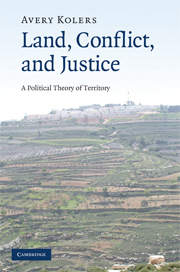Book contents
- Frontmatter
- Contents
- List of tables
- List of figures
- Foreword and acknowledgments
- Introduction
- 1 Everything you always wanted to know about taking other people's land (but were afraid to ask)
- 2 Land and territory in political theory
- 3 Groundwork
- 4 Plenitude
- 5 Territorial disputes
- 6 Implementation
- Works cited
- Index
2 - Land and territory in political theory
Published online by Cambridge University Press: 07 August 2009
- Frontmatter
- Contents
- List of tables
- List of figures
- Foreword and acknowledgments
- Introduction
- 1 Everything you always wanted to know about taking other people's land (but were afraid to ask)
- 2 Land and territory in political theory
- 3 Groundwork
- 4 Plenitude
- 5 Territorial disputes
- 6 Implementation
- Works cited
- Index
Summary
If political theory has been mostly silent about territorial rights, this might be because territorial rights do not exist. Cosmopolitan political theorists treat borders as (at best) pragmatic markers for the division of moral or political labor; borders are morally secondary, and the territories they enclose are morally justifiable, if at all, only by appeal to the equal interests of all individuals everywhere (Goodin 1988; O'Neill 2000; Scheffler 2000; Pogge 2002). Post-modern political theories may reach a similar conclusion on different grounds. Post-modernists deny the existence of prepolitical identities or sharp differentiations of identity across borders (Bishai 2004). For this reason, the idea of territorial rights must be fundamentally confused, because rights can exist only where the right-holders can be identified independently of the rights. If either of these approaches to global politics is right, then we have good reason to abandon the search for some theory that will meet the six criteria laid out in Chapter One.
Such arguments come in stronger and weaker forms. The weaker rejections of territorial rights adopt an individualistic approach. Such views, which are the subject of sections 2.1 and 2.2, hold that territorial rights, including the sorts of claims raised by indigenous peoples and others involved in ethnic/territorial conflicts, should be understood as derivative (at one or more removes) upon important individual interests. In such approaches, territorial rights may indeed be important political resources, but do not demand any special theoretic apparatus.
- Type
- Chapter
- Information
- Land, Conflict, and JusticeA Political Theory of Territory, pp. 32 - 65Publisher: Cambridge University PressPrint publication year: 2009

